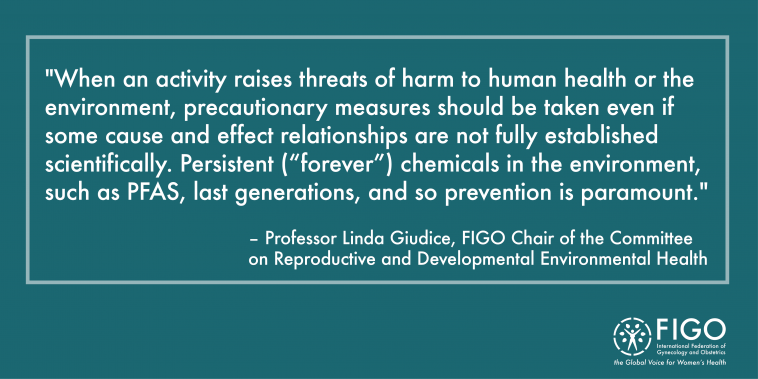New infographic and statement released on the effect of PFAS on women’s health

PFAS (per- and polyfluoroalkyl substances) are a large class of thousands of industrial chemicals that are recognised by many prominent scientists and agencies as toxicants. Extreme persistence is the defining characteristic of this class of compounds, but they can also be highly mobile, bio-accumulative and hazardous.
Many of the most-studied PFAS persist in human tissue for years, with serum half-lives ranging from several years to decades. PFAS cross the placenta, are detected in cord serum, and are transmitted to newborns and infants via contaminated breast milk.
PFAS are linked to serious health impacts even at low levels of exposure. They can affect reproductive health and birthweight and are linked to thyroid disease and asthma.
In partnership with the Health and Environment Alliance (HEAL) and the UCSF Program on Reproductive Health and the Environment (PRHE), we have developed a brand-new infographic highlighting the dangers of PFAS when it comes to women’s health, pregnancy and human development.
It also provides tangible options for clinicians to help reduce exposure to PFAS, as well as action points for advocacy work to ban PFAS.
The FIGO Committee on Reproductive and Developmental Environmental Health advocates for minimising or eliminating exposures to toxics with potential to cause harm to human health broadly and to human development and reproductive health in particular. We strongly endorse the principle that "When an activity raises threats of harm to human health or the environment, precautionary measures should be taken even if some cause and effect relationships are not fully established scientifically." Persistent (“forever”) chemicals in the environment, such as PFAS, last generations, and so prevention is paramount.
– Professor Linda Giudice, FIGO Chair of the Committee on Reproductive and Developmental Environmental Health
FIGO Statement on PFAS
In 2015, FIGO adopted Reproductive Health Impacts of Exposure to Toxic Environmental Chemicals, a scientific opinion reflecting the need for this approach to better address the threat that toxic environmental chemicals now pose to human reproductive and environmental health. Subsequently, FIGO established a global Reproductive and Developmental Environmental Health (RDEH) working group, which was designated a formal FIGO Committee in 2018.
The FIGO Statement from the Committee, on the removal of PFAS globally, urges hospitals, childcare centres, schools and other settings in which FIGO members work to preferentially purchase PFAS-free furniture, upholstery, carpet, clothing and food packaging.
In addition, we recommend that governments:
- prioritise legislation to phase out all non-essential uses and manufacturing of PFAS, starting with uses that are likely to result in greater exposures to pregnant women and children
- require transparency on PFAS use
- invest in safer alternatives for essential uses and in improved monitoring, clean-up and disposal technologies
- mitigate ongoing exposure to PFAS by cleaning up polluted environmental resources and securing storage of highly contaminated PFAS waste until a safe destruction method has been determined
- require regulatory assessment of PFAS, including toxicological and exposure assessment, as a class.